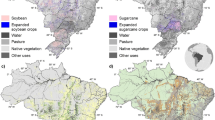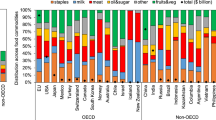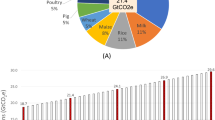Abstract
Meeting environmental sustainability goals while simultaneously recovering from the health and economic crises arising from the coronavirus pandemic requires creative policy solutions. Sugar taxation presents one such policy as sugar crops are arguably the least efficient to consume from a health perspective but the most efficient for biofuel production. Here we analyse the sustainability co-benefits of reducing sugar consumption through redirecting existing sugar cropland to alternative uses. Emissions could fall 20.9–54.3 Mt CO2e yr−1 if the EU were to reduce its sugar consumption in line with health guidelines and the excess Brazilian sugar cane redirected to ethanol. These savings would be around four times higher than an alternative strategy of afforesting existing EU sugar beet cropland and double those from producing sugar beet ethanol in the European Union. Achieving this through policies aimed at behavioural change, with a serious role for sugar taxation, would not only reduce the environmental impacts of biofuels but also provide health and economic benefits.
This is a preview of subscription content, access via your institution
Access options
Access Nature and 54 other Nature Portfolio journals
Get Nature+, our best-value online-access subscription
$29.99 / 30 days
cancel any time
Subscribe to this journal
Receive 12 digital issues and online access to articles
$119.00 per year
only $9.92 per issue
Buy this article
- Purchase on Springer Link
- Instant access to full article PDF
Prices may be subject to local taxes which are calculated during checkout




Similar content being viewed by others
Data availability
The agricultural production data that support these findings are publicly available in the FAOSTAT repository https://www.fao.org/faostat and the USDA Foreign Agricultural Service repository https://www.fas.usda.gov/data.
References
Bai, H. M., Zaid, A., Catrin, S., Ahmed, K. & Ahmed, A. J. The socio-economic implications of the coronavirus pandemic (COVID-19): a review. Int. J. Surg. 8, 8–17 (2020).
Iacobucci, G. COVID-19: public health must be “at the core” of global recovery plans, say doctors. Brit. Med. J. 369, m2077 (2020).
Lynch, J. Health equity, social policy, and promoting recovery from COVID-19. J. Health Polit. Policy Law 45, 983–995 (2020).
Belesova, K., Heymann, D. L. & Haines, A. Integrating climate action for health into COVID-19 recovery plans. Brit. Med. J. 370, m3169 (2020).
McNeely, J. A. Nature and COVID-19: the pandemic, the environment, and the way ahead. Ambio 50, 767–781 (2021).
European Council Conclusions, 17–21 July 2020 (European Council, 2020); https://www.consilium.europa.eu/en/press/press-releases/2020/07/21/european-council-conclusions-17-21-july-2020/
Van de Graaf, R. C. & Hofstra, L. Obesity and COVID-19: the role of the food industry. Brit. Med. J. 370, m2813 (2020).
Sánchez-Romero, L. M. et al. Association between tax on sugar sweetened beverages and soft drink consumption in adults in Mexico: open cohort longitudinal analysis of Health Workers Cohort Study. Brit. Med. J. 369, m1311 (2020).
Pell, D. et al. Changes in soft drinks purchased by British households associated with the UK soft drinks industry levy: controlled interrupted time series analysis. Brit. Med. J. 372, n254 (2021).
Brownell, K. D. et al. The public Health and economic benefits of taxing sugar-sweetened beverages. N. Engl. J. Med. 362, 1250–1250 (2010).
de Andrade, M. A., Watson, J. E. & Maxwell, S. L. Unveiling the environmental benefits of reducing sugar. Lancet Planet. Health 4, E497–E498 (2020).
Searchinger, T. et al. Use of U.S. croplands for biofuels increases greenhouse gases through emissions from land-use change. Science 319, 1238–1240 (2008).
Renzaho, A. M. N., Kamara, J. K. & Toole, M. Biofuel production and its impact on food security in low and middle income countries: implications for the post-2015 sustainable development goals. Renew. Sustain. Energy Rev. 78, 503–516 (2017).
Lu, Y., Nakicenovic, N., Visbeck, M. & Stevance, A.-S. Policy: five priorities for the UN Sustainable Development Goals. Nature 520, 432–433 (2015).
O’Neill, D. W., Fanning, A. L., Lamb, W. F. & Steinberger, J. K. A good life for all within planetary boundaries. Nat. Sustainability 1, 88–95 (2018).
King, L. C. & van den Bergh, J. C. J. M. Implications of net energy-return-on-investment for a low-carbon energy transition. Nat. Energy 3, 334–340 (2018).
Bernardi, L., Morales, L., Lühiste, M. & Bischof, D. The effects of the Fukushima disaster on nuclear energy debates and policies: a two-step comparative examination. Environ. Politics. 27, 42–68 (2018).
Moriarty, P. & Honnery, D. What is the global potential for renewable energy? Renew. Sustain. Energy Rev. 16, 244–252 (2012).
Solomon, B. D. Biofuels and sustainability. Ann. N. Y. Acad. Sci. 1185, 119–134 (2010).
Nazari, M. T. et al. Biofuels and their connections with the sustainable development goals: a bibliometric and systematic review. Environ. Dev. Sustain 23, 11139–11156 (2021).
de Castro, C., Carpintero, Ó., Frechoso, F., Mediavilla, M. & de Miguel, L. J. A top-down approach to assess physical and ecological limits of biofuels. Energy 64, 506–512 (2014).
Brockway, P. E., Owen, A., Brand-Correa, L. I. & Hardt, L. Estimation of global final-stage energy-return-on-investment for fossil fuels with comparison to renewable energy sources. Nat. Energy 4, 612–621 (2019).
Garofalo, P., Mastrorilli, M., Ventrella, D., Vonella, A. V. & Campi, P. Modelling the suitability of energy crops through a fuzzy-based system approach: the case of sugar beet in the bioethanol supply chain. Energy 196, 117160 (2020).
Hall, C., Balogh, S. & Murphy, D. What is the minimum EROI that a sustainable society must have? Energies 2, 25–47 (2009).
Atlason, R. S. et al. Energy return on investment of Austrian sugar beet: a small-scale comparison between organic and conventional production. Biomass Bioenergy 75, 267–271 (2015).
Steffen, W. et al. Planetary boundaries: guiding human development on a changing planet. Science 347, 1259855–1259855 (2015).
Koh, L. P. & Ghazoul, J. Biofuels, biodiversity, and people: understanding the conflicts and finding opportunities. Biol. Conserv. 141, 2450–2460 (2008).
Fargione, J., Hill, J., Tilman, D., Polasky, S. & Hawthorne, P. Land clearing and the biofuel carbon debt. Science 319, 1235–1238 (2008).
de Andrade Junior, M. A. U., Valin, H., Soterroni, A. C., Ramos, F. M. & Halog, A. Exploring future scenarios of ethanol demand in Brazil and their land-use implications. Energy Pol. 134, 110958 (2019).
Andrade Junior, M. A., Maxwell, S. L. & Watson, J. E. Renewed threats to Brazilian biodiversity from sugarcane. Front. Ecol. Environ. 18, 178–180 (2020).
Wong, T. H. T., Mok, A., Ahmad, R., Rangan, A. & Louie, J. C. Y. Intake of free sugar and micronutrient dilution in Australian children and adolescents. Eur. J. Nutr. 58, 2485–2495 (2018).
Schmidhuber, J. et al. The Global Nutrient Database: availability of macronutrients and micronutrients in 195 countries from 1980 to 2013. Lancet Planet. Health 2, e353–e368 (2018).
Swinburn, B. A. et al. The global syndemic of obesity, undernutrition, and climate change: The Lancet Commission report. Lancet 393, 791–846 (2019).
World Food and Agriculture—Statistical Yearbook 2020 (FAO, 2020).
FAOSTAT (FAO, 2020); https://fao.org/faostat/
Delgado, A. V. & de Armas Casanova, C. Sugar Processing and By-products of the Sugar Industry (FAO, 2001).
Sugar: World Markets and Trade (USDA Foreign Agricultural Service, 2021); https://www.fas.usda.gov/data/sugar-world-markets-and-trade
Brazil: Sugar Annual (USDA Foreign Agricultural Service, 2021); https://www.fas.usda.gov/data/brazil-sugar-annual-7
OECD-FAO Agricultural Outlook 2020–2029 (OECD Publishing, 2020); https://doi.org/10.1787/1112c23b-en
European Union: Sugar Annual (USDA Foreign Agricultural Service, 2021); https://www.fas.usda.gov/data/european-union-sugar-annual-1
EU Agricultural Outlook for Markets and Income 2018–2030 (European Commission, 2018); https://ec.europa.eu/info/sites/default/files/food-farming-fisheries/farming/documents/medium-term-outlook-2018-report_en.pdf
EU Sugar Balance 25 February 2021 Update (European Commission, 2012); https://ec.europa.eu/info/sites/default/files/food-farming-fisheries/farming/documents/sugar-balance-sheet-presentation_en.pdf
Guideline: Sugars Intake for Adults and Children (World Health Organization, 2015); https://www.who.int/publications/i/item/9789241549028
Cunningham, S. C. et al. Balancing the environmental benefits of reforestation in agricultural regions. Perspect. Plant Ecol. Evol. Syst. 17, 301–317 (2015).
Manochio, C., Andrade, B. R., Rodriguez, R. P. & Moraes, B. S. Ethanol from biomass: a comparative overview. Renew. Sustain. Energy Rev. 80, 743–755 (2017).
Approximated Estimates for Greenhouse Gas Emissions (European Environment Agency, 2020); https://www.eea.europa.eu/data-and-maps/data/approximated-estimates-for-greenhouse-gas-emissions-2
Bordonal, R. et al. Sustainability of sugarcane production in Brazil. A review. Agron. Sustainable Dev. 38, 13 (2018).
Popkin, B. M. & Ng, S. W. Sugar-sweetened beverage taxes: Lessons to date and the future of taxation. PLoS Med. 18, e1003412 (2021).
Bandy, L. K., Scarborough, P., Harrington, R. A., Rayner, M. & Jebb, S. A. Reductions in sugar sales from soft drinks in the UK from 2015 to 2018. BMC Med. 18, 20 (2020).
Teng, A. M. et al. Impact of sugar‐sweetened beverage taxes on purchases and dietary intake: systematic review and meta‐analysis. Obes. Rev. 20, 1187–1204 (2019).
Andreyeva, T., Long, M. W. & Brownell, K. D. The impact of food prices on consumption: a systematic review of research on the price elasticity of demand for food. Am. J. Public Health 100, 216–222 (2010).
Pfinder, M. et al. Taxation of unprocessed sugar or sugar-added foods for reducing their consumption and preventing obesity or other adverse health outcomes. Cochrane Database Syst. Rev. https://doi.org/10.1002/14651858.CD012333.pub2 (2016).
Taillie, L. S. et al. Changes in food purchases after the Chilean policies on food labelling, marketing, and sales in schools: a before and after study. Lancet Planet. Health 5, e526–e533 (2021).
WHO Report on the Global Tobacco Epidemic, 2017 (WHO, 2017).
Pell, D. et al. Support for, and perceived effectiveness of, the UK soft drinks industry levy among UK adults: cross-sectional analysis of the International Food Policy Study. BMJ Open 9, e026698 (2019).
Drews, S. & van den Bergh, J. C. J. M. What explains public support for climate policies? A review of empirical and experimental studies. Clim. Policy 16, 855–876 (2015).
Outlaw, J. L. et al. Economics of sugar-based ethanol production and related policy issues. J. Agric. Appl. Econ. 39, 357–363 (2007).
Pillay, C. & van den Bergh, J. C. M. Human health impacts of climate change as a catalyst for public engagement. Int. J. Clim. Change Strateg. Manag. 8, 578–596 (2016).
World Population Prospects 2019 (Department of Economic and Social Affairs, United Nations, 2019); https://population.un.org/wpp/
Hoffman, S. J. et al. Cigarette consumption estimates for 71 countries from 1970 to 2015: systematic collection of comparable data to facilitate quasi-experimental evaluations of national and global tobacco control interventions. BMJ 365, l2231 (2019).
Klenk, I., Landquist, B. & de Imana, O. R. The product carbon footprint of EU beet sugar (part I). Sugar Ind. 137, 169–177 (2012).
IPCC IPCC Special Report Land Use, Land Use Change, and Forestry (Cambridge Univ. Press, 2000).
Review of EU Biofuels Directive (Energy and Transport Directorate-General, European Commission, 2006).
Quality and Greenhouse Gas Intensities of Transport Fuels in the EU in 2017 (European Environmental Agency, 2019); https://www.eea.europa.eu/publications/quality-and-greenhouse-gas-intensities-1
de Figueiredo, E. B., Panosso, A. R., Romão, R. & La Scala, N.Jr. Greenhouse gas emission associated with sugar production in southern Brazil. Carbon Balance Manag. 5, 3 (2010).
Rein, P. W. The carbon footprint of sugar. Sugar Ind. 135, 427–434 (2010).
IPCC 2006 IPCC Guidelines for National Greenhouse Gas Inventories (IGES, 2006).
Acknowledgements
The research received financial support from the Spanish Ministry of Science and Innovation through the ‘María de Maeztu’ Programme for Units of Excellence (CEX2019-000940-M) and from the European Union through an Advanced European Research Council Grant under the EU’s Horizon 2020 programme (grant agreement number 741087).
Author information
Authors and Affiliations
Contributions
L.C.K. and J.v.d.B. jointly designed the study and wrote the paper. L.C.K. performed the analysis.
Corresponding author
Ethics declarations
Competing interests
The authors declare no competing interests.
Peer review
Peer review information
Nature Sustainability thanks Saleh Mamun and Barry D. Solomon for their contribution to the peer review of this work.
Additional information
Publisher’s note Springer Nature remains neutral with regard to jurisdictional claims in published maps and institutional affiliations.
Rights and permissions
About this article
Cite this article
King, L.C., van den Bergh, J. Sugar taxation for climate and sustainability goals. Nat Sustain 5, 899–905 (2022). https://doi.org/10.1038/s41893-022-00934-4
Received:
Accepted:
Published:
Issue Date:
DOI: https://doi.org/10.1038/s41893-022-00934-4



